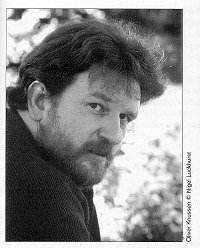Concert report for S&H
Knussen at 50 The London Sinfonietta 12 June 2002 Queen Elizabeth Hall, London (PGW)
6.30pm
Wuorinen Fifty Fifty (WP)
Anderson Quasi una Passacaglia (WP)
Henze Olly on the Shore
Turnage Fanfares and Ostinatos
Zuidam I suppose a Fugue is out of the Question (WP)
Glanert Dancing Landscape (WP)
Rolf Hind, Nicolas Hodges pianos
WP = world premiere
7.45pm
Knussen Masks
Knussen Océan de Terre
Carter Au Quai (WP)
Knussen Coursing
Andriessen Very Sharp Trumpet Sonata (WP)
Knussen Ophelia Dances
Goehr only two notes for olly (the other five for later) WP*
Knussen Elegiac Arabesques
Knussen Songs without Voices
Matthews Flourish, with fireworks WP*
Turnage Snapshots WP*
Lindberg Bubo bubo WP*
Thomas Light the First Light of Evening WP*
Knussen Two OrganaOliver Knussen conductor
George Benjamin conductor *
Claire Booth soprano
Oliver Knussen was celebrated with enthusiasm and great affection in this lengthy evening. Knussen shared the conducting with George Benjamin, another fastidious composer who is slowly building up an impressive catalogue of compositions. Elliott Carter sent Au Quai for viola and bassoon, based on a short story by Arnold Schoenberg; if the programme note is to be believed, that French phrase is the origin of the internationally ubiquitous OK. There were solo and duet spots for many of the Sinfonietta's players and several substantial works by the evening's hero, notably the virtuosic Coursing, Ophelia Dances. Claire Booth (who specialises in Knussen's vocal music and will be giving his Rilke settings at the Cheltenham Festival) was very confident in the early surrealist Apollinaire setting Ocean de Terre. Those apart, Alexander Goehr's economical little only two notes for olly was particularly striking and successful.I confess to having not quite lasted the course. We arrived for a scheduled 6 p.m. recital but the start had been moved to 6. 30. Rolf Hind and Nicolas Hodges played short piano pieces composed specially for Knussen separately and together; well crafted miniatures all of them. The main concert started at 7.45 and when we departed at 9.45, having heard 55 minutes music, there was still another interval and a scheduled twenty minutes more of music to go, which would have stretched out till over four hours since the proceedings had begun! Numerous platform re-arrangements and tweaking the precise positioning of each of the microphones, nearly one per musician, gave plenty of time for the audience (one of those occasions when 'everyone' was there!) to chat.
A good event, but the concert ritual (lengthened further with separate recording set-ups for each work) does suggest the need for a re-think. David Munrow in his concerts of short pieces used to organise slick presentation by keeping all the musicians on stage, which might have been especially appropriate for a musical party such as this celebratory evening and helped those with long journeys home.
Peter Grahame Woolf

 Return to:
Return to: